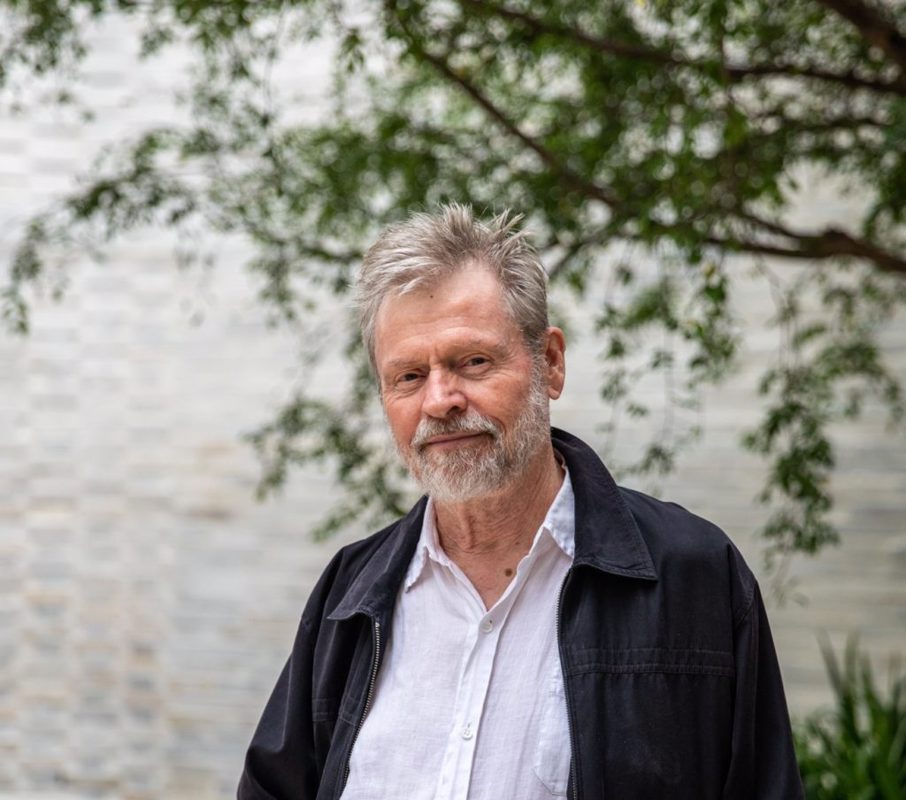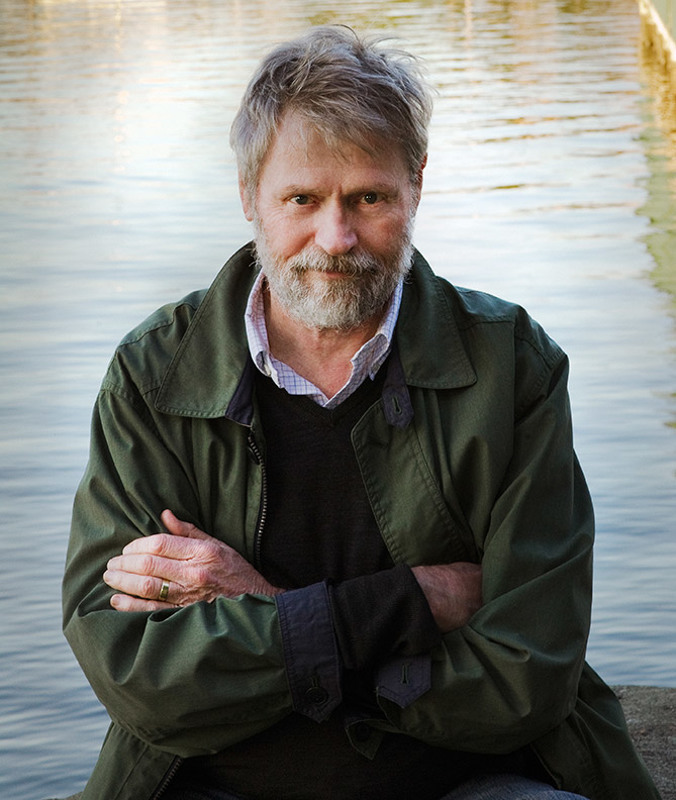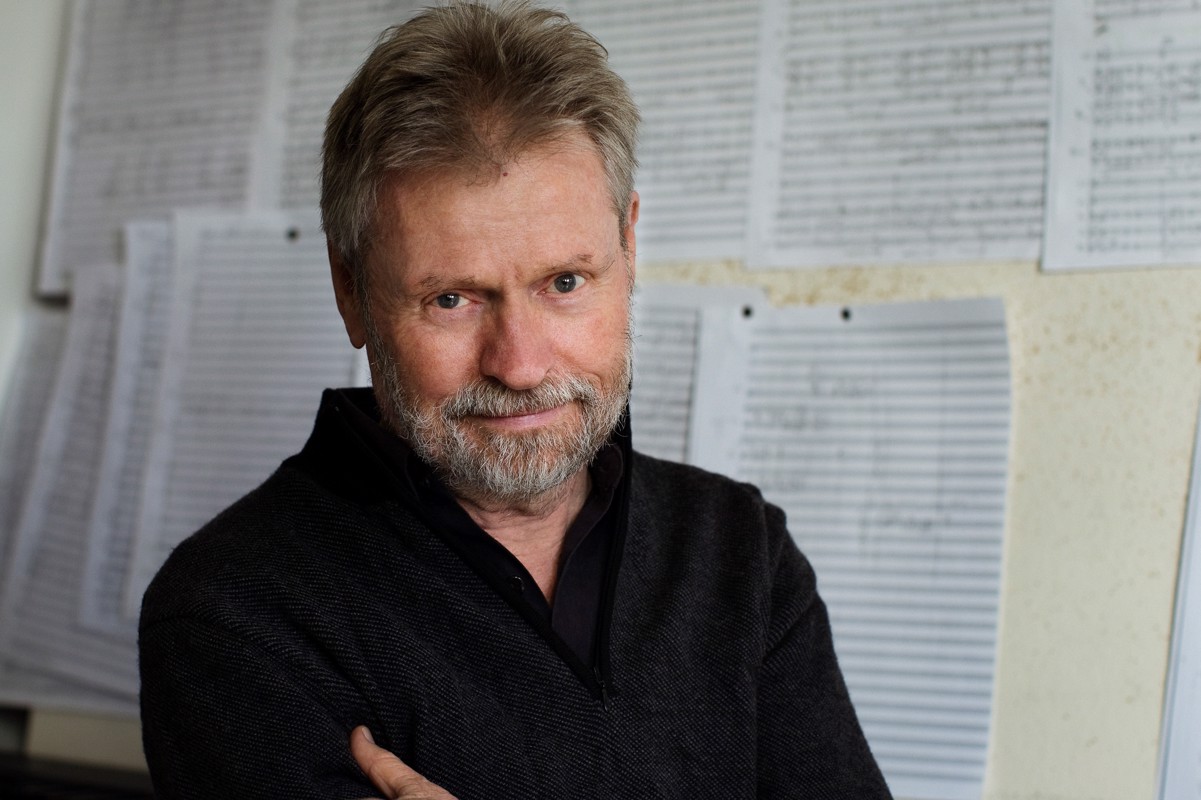Ross Edwards
b. 1943
Australian
Summary
Ross Edwards is one of Australia’s most distinctive and recognisable musical voices. His unique sound world evokes and is drawn from the natural environment, elemental forces and human connectedness.
Edwards’ Dawn Mantras greeted the new 2000 millennium in a global telecast from the sails of the Sydney Opera House to universal acclaim and an estimated audience of two billion people around the world.
Other well-lauded works include his Fourth Symphony – Star Chant, Maninyas: Concerto for Violin and Orchestra, Bird Spirit Dreaming, Full Moon Dances and Frog and Star Cycle. Edwards has been engaged by many commissioners across his career including Symphony Australia, Sydney Symphony Orchestra, Adelaide Festival, Melbourne International Chamber Music Competition, Australia Broadcasting Commission and the National Gallery of Australia. His ballet, Zodiac was commissioned by one of the largest and well-respected ballet companies in the US, Houston Ballet.
As one of Australia’s best known and most performed composers, Edwards has won several APRA-AMC Art Music Awards, including the Award for Excellence by an Individual in 2015 for his contribution to Australian chamber music. In 1994 Edwards received an ARIA Award for the recording of his violin concerto (Maninyas), performed by Sydney Symphony Orchestra with Dene Olding as soloist. In 1997, Ross Edwards was appointed a Member of the Order of Australia (AM).
Critical Acclaim
"Indisputably, Ross Edwards is now Australia’s most renowned and revered composer. Fifteen months short of his 80th birthday, Edwards has developed his own distinctive musical sonology; almost instantaneously, a listener can declare, “Oh, this must be Ross!” Few other composers can claim that sense of immediate identification. Such was the case with a percussion quartet he wrote for Synergy, which they premiered in 1985 and performed on international tours, to considerable acclaim. Now entitled Reflections,this nine-minute gem recalls the several years Edwards lived in the idyllic coastal village of Pearl Beach, barely a 90-minute drive north of Sydney. It contains the full vocabulary of Edwards’ language – insect drones, bird calls and other nature sounds – which were to blossom in the rhythmic vitality of the Maninyas series." - Vincent Plush, Limelight Magazine
"Ross Edwards is arguably our most recognisable homegrown musical voice. (He) has absorbed the land's original sounds through his pores, and they flow back through his pen." - Adelaide Advertiser
"Edwards' soundworld is instantly recognisable - at once earthy and transcendental, mysterious and resplendent, fluid and geometric. He has cultivated a music that somehow captures the elemental, the ecological, the universal; and yet which remains utterly idiosyncratic." - Mark Bosch, CutCommon
"If you're looking for a quintessentially Australian sound you can't go far wrong with Edwards (who) has an instinct for sound that goes beyond clever orchestration, and he makes these features sound fresh and exciting. This is due in part to their sheer sensual gorgeousness, a beauty that bears repetitition." - Andante.com
"Ross Edwards, who gave us the oboe concerto that is the dance of life." - Lorin Maazel, Chief Conductor, New York Philharmonic Orchestra
"Personally Ross has figured highly in my own formulation of the strength of Australian music: His pieces are so beautiful and his output so extensive that he cannot but be noted as a major figure in our history. That listeners repeatedly say how much they love his music makes it easy to schedule on radio." - John Crawford, Manager ABC Classic FM
"In my opinion Edwards' Symphony Da Pacem Domine...is clearly the greatest piece of serious music by a living composer." - William D. Rubinstein, Professor of Modern History at the University of Wales, Aberystwyth
"In some nations, a composer of Ross Edwards' enduring stature would be widely celebrated, even allocated an annuity. His music affirms life and humanity, underpinned by decades of dedication to his craft. Long may he compose for us." - Philip Pogson, Music Trust
Biography
One of Australia’s best known and most performed composers, Ross Edwards AM has created a distinctive sound world aligned with principles of deep ecology while seeking to reconnect music with elemental forces and restore its traditional association with ritual and dance. His music, universal in that it is concerned with age-old mysteries surrounding humanity, is at the same time deeply connected to its roots in Australia, whose cultural diversity it celebrates, and from whose natural environment it draws inspiration, especially birdsong and the mysterious rhythms and drones of insects.
As a student at the Universities of Sydney and Adelaide, Edwards was fortunate in having among his teachers such luminaries as Richard Meale, Sándor Veress and Sir Peter Maxwell Davies, the latter with whom he later undertook postgraduate studies in London. During vacations he worked with Peter Sculthorpe, gaining valuable insight into the working life of a composer.
Returning to Australia, he became a lecturer in The Sydney Conservatorium’s School of Composition, remaining there until 1980, when he began to freelance as a composer. For seven years he and his wife Helen, a piano teacher, lived with their two children in the coastal village of Pearl Beach, north of Sydney, a crucial time for Edwards as the sound world of the adjacent national park had a profound influence on the formation of his musical language. Today he is based in Sydney. He is an Honorary Adjunct Professor of Composition at the Sydney Conservatorium.
Edwards has won several APRA-AMC Art Music Awards, including the Award for Excellence by an Individual in 2015 for his contribution to Australian chamber music. In 1994 Edwards received an ARIA Award for the recording of his violin concerto (Maninyas), performed by Sydney Symphony Orchestra with Dene Olding as soloist.
Reclusive by nature, Edwards has been less interested in following a conventional career path than with responding to the inner dictates of his vocation, making oblique references to many cultures in what he describes as an "intuitive search for unity within diversity". He has also stated that underlying all his music "the natural environment remains the supreme generative force".
Far from being isolationist, however, his music is widely performed and represented at major international music festivals including the Vale of Glamorgan Festival, Wales; the Edinburgh International Festival; the Australian Festival of Chamber Music, Townsville; the Mostly Mozart Festival, New York; the City of London Festival; the Darwin International Guitar Festival; the Canberra International Music Festival; the Adelaide Festival; the Melbourne Festival; the Tucson Winter Chamber Music Festival, Arizona; International Society for Contemporary Music Festivals in Stockholm, Basel, Warsaw and Sydney; and the Festivals of Sydney and Perth.
Perhaps Edwards’ best-known work, Dawn Mantras greeted the new 2000 millennium in a global telecast from the sails of the Sydney Opera House to universal acclaim and an estimated audience of two billion people around the world.
Significant events include the award of a joint Australian Broadcasting Corporation/Australian Bicentennial commission to compose the violin concerto Maninyas (1988); the Australia Council's Don Banks Music Award (1989); Australian Creative "Keating" Fellowships in 1990 and 1995; and award of the Order of Australia – AM (1997).
Well-lauded works include his Fourth Symphony – Star Chant, Bird Spirit Dreaming, Full Moon Dances and Frog and Star Cycle. Edwards has been engaged by many commissioners across his career including Symphony Australia, Sydney Symphony Orchestra, Adelaide Festival, Melbourne International Chamber Music Competition, Australia Broadcasting Commission and the National Gallery of Australia. His ballet, Zodiac was commissioned by one of the largest and well-respected ballet companies in the US, Houston Ballet.
Other commissions include Sacred Kingfisher Psalms for The Song Company, Ars Nova Copenhagen and the Edinburgh Festival; a piano sonata for Bernadette Harvey; Five Senses, a song cycle to poems of Judith Wright; The Laughing Moon for the New Sydney Wind Quintet; and the string quartet Summer Dances, for the Hungarian Kelemen Kvartett commissioned by Kim Williams for Musica Viva Australia.
ABC Classic recently released Edwards’ Frog and Star Cycles which features recordings of a selection of his orchestral works performed by both the Sydney Symphony Orchestra and Melbourne Symphony Orchestra. The recording was given a five-star review by The Australian’s Graham Strahle and Limelight Magazine’s Tony Way noted “Listening to this long overdue issue of two symphonies and a double concerto for percussion and alto saxophone, … there is a wonderful synergy between Edwards’ joyous breadth of expression and his quiet spiritual depth.”
News

- World Premiere of Ross Edwards’ Craven Creek Chants
- 26th August 2024
- World Premiere of Ross Edwards’ Craven Creek Chants

- Australia has voted with its ears!
- 19th June 2024
- Australia has voted with its ears!

- Ross Edwards' Vespers for Mother Earth - World Premiere
- 5th June 2024
- Ross Edwards' Vespers for Mother Earth - World Premiere

- Season's Celebrations!
- 12th December 2023
- Season's Celebrations!

- Season’s Celebrations!
- 12th December 2023
- Season’s Celebrations!

- Ensembles feature Wise Music works
- 23rd August 2023
- Ensembles feature Wise Music works
Performances
Features

- Intrinsically Danceable: Ross Edwards
- Originally composed for orchestras and ensembles, the music of Ross Edwards is frequently used in the context of dance – and for good reason.

- The Best Recordings of 2022 from Wise Music Classical
- Wise Music Classical invites you to enjoy a selection of the best recordings of 2022, featuring composers from across our international family of publishing houses.

- Our Earth | Focus on...Climate Change
- Celebrate the environmental consciousness of Wise Music Group composers as we explore the meeting of art and activism in compositions which echo the urgent call of our planet.

- The Best Recordings of 2023 from Wise Music Classical
- Wise Music Classical invites you to enjoy a selection of the best recordings of 2023, featuring composers from across our international family of publishing houses.

- The Chamber Music Works of Ross Edwards
- In 2023, his 80th Birthday year, we celebrate the Chamber Music of Ross Edwards.
Photos
Discography
- LabelABC Classics
- Catalogue Number28948552467
- ConductorRichard Mills
- EnsembleAustralia Ensemble / ACO Collective / Tasmanian Symphony Orchestra
- ReleasedJuly 2024
- Works
- LabelABC Classics
- Catalogue NumberABCL0031D
- ConductorRichard Mills
- EnsembleClaire Edwardes / Karin Schaupp / Tasmanian Symphony Orchestra
- ReleasedJuly 2024
- Works
- LabelAmbiente Audio
- Catalogue NumberACD 3061
- EnsembleStefan Barcsay
- Released17th May 2024
- Works
- LabelAvie
- Catalogue NumberAV2495
- EnsembleEmily Granger
- Released11th March 2022
- Works
- LabelABC Classic
- ConductorDavid Zinman / Markus Stenz / Lothar Koenigs
- EnsembleSydney Symphony Orchestra / Melbourne Symphony Orchestra
- SoloistYvonne Kenny, soprano; Amy Dickson, alto saxophone; Colin Currie, percussion
- Released25th February 2022
- Works
- LabelWirripang
- Catalogue NumberWirr 102
- EnsembleVictoria Jacono-Gilmovich / Sally Whitwell
- Released2020
- Works
- LabelABC Classics
- Catalogue Number476 227-0
- ConductorRichard Mills
- EnsembleTasmanian Symphony Orchestra
- SoloistKarin Schaupp; Guitar
- Released3rd July 2020
- Works
- LabelABC Classics
- Catalogue Number28948189137
- EnsembleIan Munro / Goldner String Quartet
- Released8th November 2019
- Works
- LabelMaybe Music
- Catalogue Number3616401756902
- EnsembleMax Olding / Caroline Almonte / Ian Munro / Rebecca Chambers / Phillip Shovk
- Released8th October 2019
- Works
- LabelCala
- Catalogue NumberCACD77017
- EnsembleJacob Cordover
- Released2019
- Works
Classical Music to Lift Your Spirits Volume 1

Classical Music to Lift Your Spirits Volume 2

Nocturnes

In Transit

Frog and Star Cycle

Another Look at Autumn

White Ghost Dancing

Huntington Estate Music Festival

Sunburnt Country: Piano Music from Australia

Blackwattle Caprices




